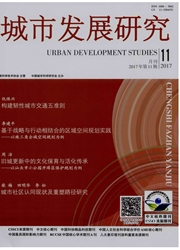

 中文摘要:
中文摘要:
在中国,劳动力在城市间流动性的逐渐增强使得居民能够自由选择居住城市,这种居民在城市间的重分布促使房价被重估,更准确地反映居民对于城市价值(包括城市经济发展质量和城市生活质量)的支付意愿。本文对中国35个大中城市的实证研究表明,在我国城市住宅市场中,城市价值已经被很显著地资本化到房价当中。城市居民的劳动收入水平越高,或者城市生活质量越好,城市的房价就会越高,这意味着,人们愿意为居住在一个城市所支付的成本(即房价),取决于他们能够在这个城市里获得怎样的经济收入和发展机会,以及享受怎样的生活质量、本研究还发现,在早期,城市生活质量要素在房价中是被低估的,向合理水平的收敛过程会带来房价的上升。同时,收入要素对房价的贡献度在下降,而城市生活质量要素对房价的贡献明显上升,表明居民在选择城市时更加重视城市的自然环境和城市政府提供的公共服务的质量。
 英文摘要:
英文摘要:
In China, Ihe increasing labor mobility across cities makes it possible for people to choose which city to stay in. Such a labor redistribution across cities pushes house price to eonverge to its long-term equilibrium level determined by the value of city, including city economic growth and quality of living. This paper does an empirical test using the house price and amenity data in 35 Chinese cities. The results show that the city value variables can explain a large part of the variation of house price across cities. Cities with higher labor income and higher quality of living always have higher house prices, which means that people would like to pay higher living cost (house price) to stay in a city to pursue higher income or higher qualily of living. We also find that many urban amenities were undervalued in tbe past, and the convergence process towards their equilibrium levels will lead to house price growth. The income premium is decreasing, while urban amenity premium is increasing in house price, which indicates that people's willingness-to-pay for the natural environment in a city and the local public serviced provided by city government.
 同期刊论文项目
同期刊论文项目
 同项目期刊论文
同项目期刊论文
 期刊信息
期刊信息
